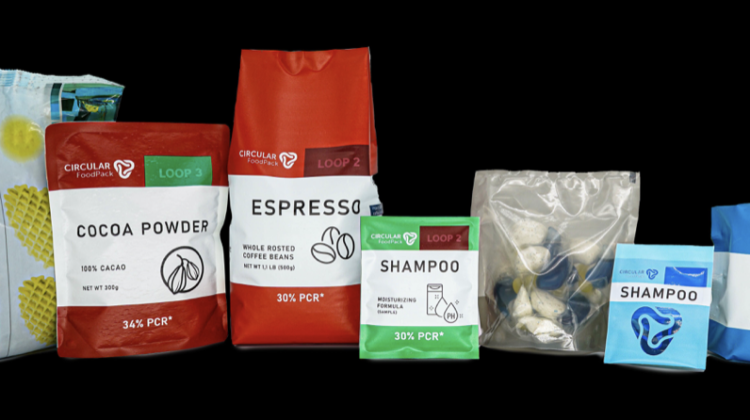
After three and a half years of intensive research, the EU project CIRCULAR FoodPack has developed new processes to effectively recycle flexible-polyethylene food packaging. The project partners have applied and validated a tracer-based sorting technology that can separate food and non-food packaging waste. A combination of novel pre- and post-treatments with mechanical or solvent-based recycling processes is used to remove printing inks, odors and other impurities from the food packaging waste.
The resulting post-consumer recyclates fulfill the quality requirements for their further processing into new flexible packaging. They can be integrated in new home and personal-care packaging and in future, together with a newly developed barrier concept, post-consumer recyclates may also be feasible in food packaging. The project was coordinated by the Fraunhofer Institute for Process Engineering and Packaging IVV, based in Freising, Germany. A total of 15 companies and research institutes were involved in the project. Funded by the European Union, CIRCULAR FoodPack received around 5.4 million euros from the Horizon 2020 framework program.
The packaging industry has so far used flexible-plastic, multilayer composites (MLC) containing a mixture of materials to pack home and personal-care products and food. These composites possess barrier characteristics to fulfill high requirements in terms of safety and hygiene, protecting the packaged goods against oxidation and humidity. Until now, however, it has been impossible to separate the plastic layers again, making them difficult to recycle. In Europe, they have generally been incinerated or ended up in landfill. In addition, EU law prevents recycled materials from non-food packaging being used to produce new food packaging. Until now, no sorting system has been able to distinguish between and separate food and non-food packaging in a mixed packaging wastestream. Furthermore, there has been no advanced physical recycling processes capable of removing impurities from the plastic MLC, or of deinking and deodorizing the material, which would guarantee the necessary quality for its repeated use in flexible food packaging. This has been the challenge that the EU project CIRCULAR FoodPack has now successfully overcome.
More info on the project: https://www.ivv.fraunhofer.de/en/recycling-environment.html
CIRCULAR FoodPack supports the EU’s aim of a better circular economy. The Packaging and Packaging Waste Regulation (PPWR) adopted by the European Parliament on Nov. 27 seeks to reduce packaging waste and increase the use of post-consumer recycled materials in packaging. Furthermore, the PPWR imposes a requirement for every piece of packaging to be recyclable by 2030.
“Our innovative, effective sorting and recycling process for post-consumer food packaging waste provides high-quality and pure recycled polyethylene suitable for use in newly designed packaging for sensitive contents. We have demonstrated the economic and environmental viability and assessed the social sustainability of flexible food packaging recycling. With these technological innovations, we want to drive forward the circular economy in Europe, strengthen the recycling industry and contribute to the PPWR objectives,” says Project Coordinator Dr. Esra Kücükpinar from Fraunhofer IVV. “Investments and further research, however, are needed to implement CIRCULAR FoodPack technologies in the industrial, circular value chain and to further monitor and improve integration of PE PCR in food packaging.”

